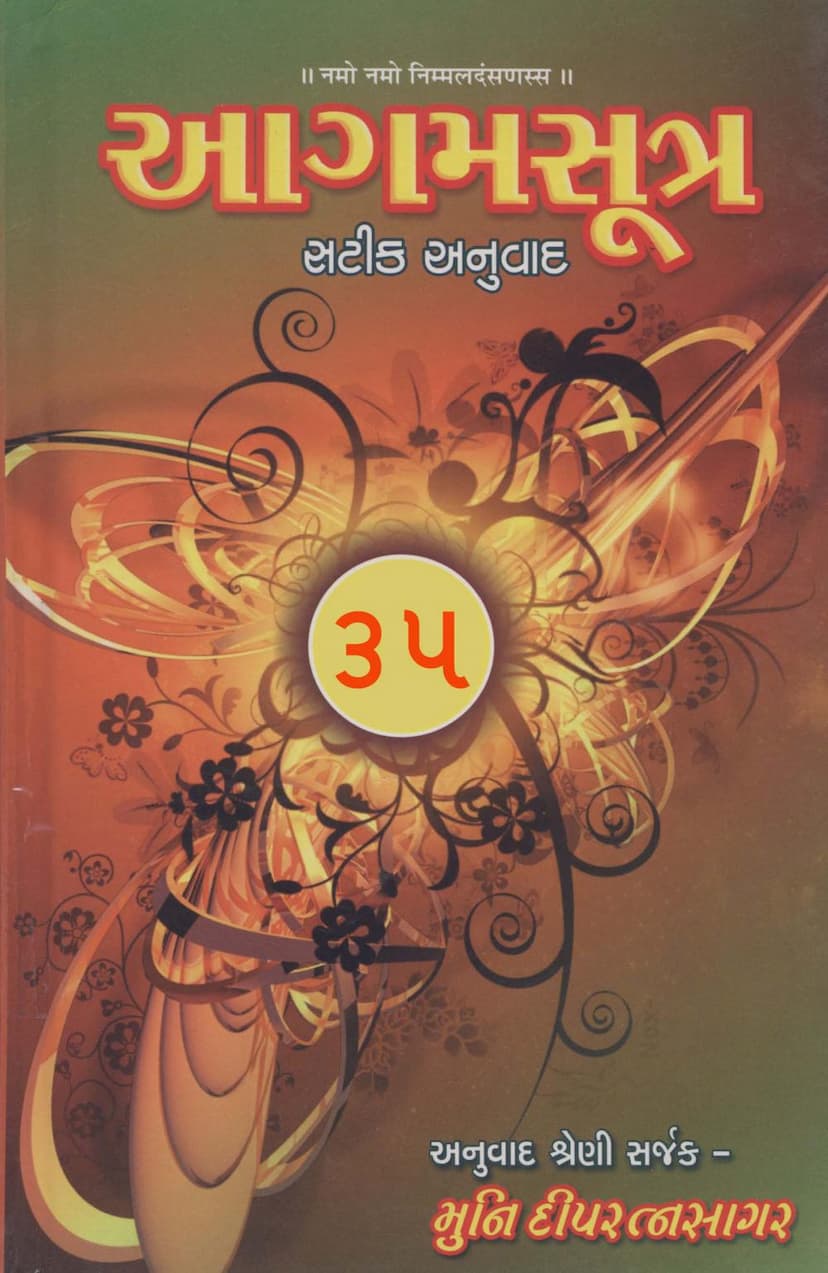Agam 41B Pindniryukti Sutra Satik Gujarati Anuvad
Added to library: September 1, 2025

Summary
This document is a Gujarati translation and commentary of the Jain scripture "Pindnirukti Sutra," which is part of the Agam literature (Agam 41B). The work is titled "Agam 41B Pindniryukti Sutra Satik Gujarati Anuvad" and is authored by Dipratnasagar and Deepratnasagar, published by Deepratnasagar.
Here's a breakdown of the provided text:
Core Content:
-
Subject: The text deals with the "Pindnirukti," which is the second sutra in the collection of Agam 41. It's also known as "Pindniruykti" in Prakrit. The text focuses on the rules and principles related to "Pind" (alms food), its purity, acquisition, and consumption by Jain monks and nuns.
-
Structure: The "Pindnirukti" contains 671 gathas (verses) and is described as being closely related to the Dasavaikalika Sutra, specifically detailing the fifth chapter called "Pindeshana." It is considered an independent treatise.
-
Key Themes:
- Pind (Alms Food): It elaborates on the nature of alms food, its origins, the faults in its acquisition (udgam, utpadana, eshana), and the proper methods of consumption.
- Doshas (Faults): A significant portion of the text details various faults associated with alms food, categorized into types like:
- Nikshep (Classification): Discusses Pind in terms of name, establishment (pratima), substance, place, time, and mode.
- Dravya Pind (Material Alms): Details alms related to earth-bodied, water-bodied, fire-bodied, air-bodied, plant-bodied, and sensory-bodied beings, and their pure/impure states.
- Bhav Pind (Psychological Alms): Explains meritorious and demeritorious mental states that influence the monastic path.
- Specific Faults: A large number of verses are dedicated to explaining various faults in alms, such as:
- Aghatakarma: Actions performed with a specific intention for monks, often involving specific preparations or arrangements.
- Adhahkarma: Actions that lower one's spiritual state or lead to degradation.
- Atmaghna: Actions that harm the self or the soul.
- Atmakarma: Actions that bind the soul with karma.
- Pratishevna, Pratisravana, Samvasa, Anumodana: Various degrees of involvement and approval of improper alms.
- Vidya, Mantra, Churna, Yoga, Mula Karma: Practices and substances used with supernatural or occult intentions, often related to influencing others or achieving specific results.
- Prabhriti: Things prepared or set aside for a specific purpose.
- Abhyahata: Alms obtained without proper intention or awareness.
- Udbhinna: Alms obtained by breaking or opening something.
- Malopahata: Alms that are impure or tainted.
- Anikrushta: Alms not properly obtained or considered impure.
- Adhyavapurva: Alms prepared with excess or improper additions.
- Puti: Alms that are spoiled or impure.
- Mishra: Mixed alms.
- Sankhalita: Alms collected from multiple sources or pre-arranged.
- Naimittika: Alms obtained for a specific occasion or reason.
- Anukampa: Compassion-driven alms.
- Bhajana: The act of eating or consumption.
- Chikitsa: Alms taken for medicinal purposes.
- Krodha, Mana, Maya, Lobha: Faults related to anger, pride, deceit, and greed in alms-taking.
- Samstava: Associating with improper company.
- Nimit: Using omens or predictions to obtain alms.
- Sanyojana: Improper mixing of ingredients.
- Prakarana: Improper preparation or arrangement.
-
Alternative Sutra: The text also mentions "Oghaniryukti" as an alternative sutra for Agam 41, which describes seven "Dwaras" (gates) related to monastic conduct. The translation of Oghaniryukti is presented in a summarized form.
Context and Significance:
- Charaṇkaryāṇuyog: The text is primarily considered to be part of the Charaṇkaryāṇuyog, which deals with conduct, discipline, and practices for Jain ascetics.
- Importance of Purity: The meticulous detailing of faults and their rectification highlights the Jain emphasis on the purity of conduct and the avoidance of any action that could lead to sin or spiritual harm, especially concerning the sustenance of an ascetic.
- Commentary: The term "Satik" in the title indicates that this is a version with a detailed commentary, likely based on the works of ancient Jain acharyas like Acharya Malayagiri.
Publisher and Sponsors:
- The text acknowledges support from various Jain Sangh (communities) and trusts, indicating a collective effort in preserving and disseminating this sacred scripture. Several individuals and organizations are listed as financial supporters for this publication.
- The publisher, Deepratnasagar, seems to be a dedicated entity for publishing Jain Agam literature.
Overall Purpose:
The "Pindnirukti Sutra Satik Gujarati Anuvad" serves as a comprehensive guide for Jain ascetics on the principles of pure alms-taking and conduct. It aims to provide a detailed understanding of the subtle nuances and potential pitfalls in the monastic life, particularly concerning food, and offers guidance on maintaining spiritual purity and progressing on the path to liberation.